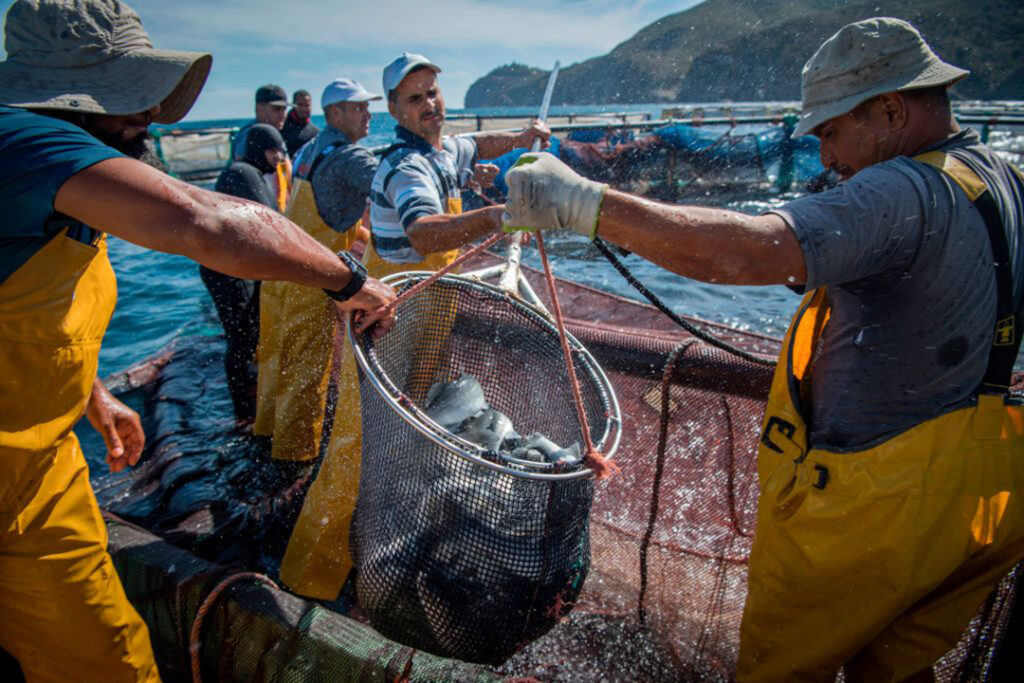ADF STAFF
Coastal states are sounding the alarm that a lack of resources to patrol waters, combined with limited surveillance of vessel activity, are enabling illegal fishing and leading to food insecurity and the loss of income for millions of people.
Those facts were underscored during a seminar led by the Ministerial Conference on Fisheries Cooperation among African States Bordering the Atlantic Ocean (ATLAFCO) in Morocco in May.
Illegal fishing “negatively affects the livelihoods of people who depend on fisheries in the African coastal countries,” Abdennaji Laamrich, ATLAFCO’s head of cooperation and information systems, said in a report by Ghanaian newspaper Daily Graphic. “Regardless of where we live, the food we eat, and the language we speak, we all rely on the oceans to keep us alive. Illegal, unreported and unregulated (IUU) fishing threatens this vital resource.”
An intergovernmental organization, ATLAFCO boasts 22 member countries spanning the distance from Morocco to Namibia. The organization aims to bolster cooperation among member nations to preserve and develop fisheries resources.
Foreign fishing fleets have targeted coastal African waters for decades.
China is by far the worst IUU fishing offender in West Africa, where analysts say 40% to 60% of all fish are caught illegally. China commands the world’s largest distant-water fishing fleet and is the world’s worst IUU offender, according to the IUU Fishing Index.
Weak governance, lack of transparency, and limited administrative and legal frameworks to address IUU fishing compound maritime challenges, experts say. A lack of patrol vessels and surveillance systems makes it hard for authorities to monitor regional waters, particularly the Gulf of Guinea’s combined coastline of more than 6,000 kilometers.
Illegal marine trade costs West Africa almost $1.95 billion across the fish value chain and $593 million per year in household income. Illegal fishing also destroys ecosystems and has been linked to piracy, kidnapping and drug trafficking.
Abdelouahed Benabbou, ATLAFCO’s executive secretary, called for coordinated regional efforts to combat illegal fishing during the seminar. Morocco, for example, has committed to helping ATLAFCO member nations eradicate illegal fishing, Benabbou told Daily Graphic.
Other efforts are underway in the Indian Ocean.
Over time, the Seychelles and other island states in the Western Indian Ocean, including Comoros, Madagascar, Mauritius, and the French island of Réunion, have bolstered maritime security through membership in the Indian Ocean Commission (IOC). The commission helps them increase law enforcement cooperation, intelligence sharing and coordination across borders to counter sea crime.
By 2019, the Regional Coordination Operations Centre (RCOC) in Seychelles, which mainly conducts joint law enforcement actions at sea, was working around the clock with the Madagascar-based Regional Maritime Information Fusion Centre, which shares maritime information and alerts the RCOC of suspicious activity at sea.
Through the IOC-created centers, seven countries have signed agreements to exchange and share maritime information and participate in joint actions on the water: Comoros, Djibouti, Kenya, Madagascar, Mauritius, Réunion and Seychelles.
In May 2021, the Fisheries Committee for the West Central Gulf of Guinea established a Regional Monitoring, Control and Surveillance Centre to help counter illegal fishing.
The center helps member countries Benin, Côte d’Ivoire, Ghana, Liberia, Nigeria and Togo manage their fishing sectors. It is equipped with vessel-tracking systems and can collect data on authorized fishing vessels across the region.

